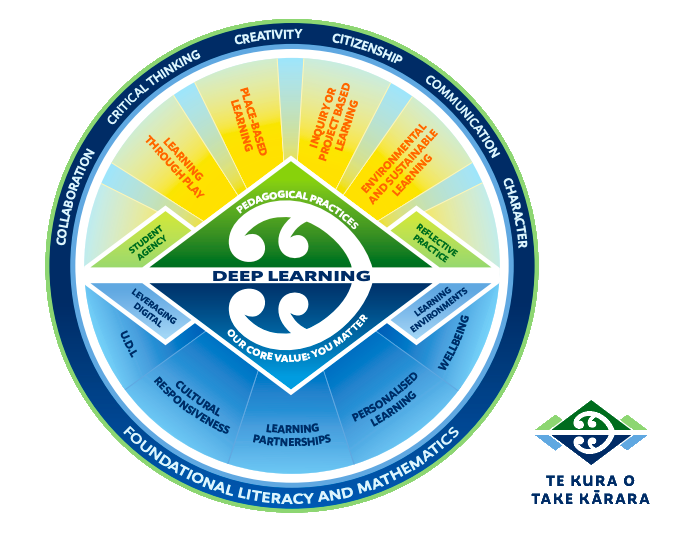Develop practices that deepen learning (below the lake’s surface) utilising the strength of our visions and our pedagogical practices (that stand as the mountains) to enable deep learning opportunities in our everyday practices (seen through the sun’s rays). Foundational literacy and mathematics and the learning competencies wrap round the whole Deep Learning Framework.
Learning Through Play is a pedagogical approach where play is the valued mode of learning – where children can explore, experiment, discover, and solve problems in imaginative and playful ways.
Place-Based learning promotes learning that is local – the unique history, environment, culture, economy, literature and art of a particular place – the learners’ own place – school, neighbourhood, town or community.
Inquiry and project based learning is a process driven by children’s curiosity about the world around them. Within this approach, children investigate and respond to a worthy question, idea, problem or challenge within a local or global context that are real to them.
Environmental and Sustainable Learning is about thinking and acting in ways that will safeguard the future wellbeing of people and our planet.
Student agency allows learners to feel in control of things that happen around them, being more active in the learning process, and actively involved in the decisions about their learning, the environment and the people around them.

Pedagogical practices: Teachers need to know how to scaffold experiences and challenges, finely tune them to the needs and interests of students, and maximize learning through relevance, authenticity, and real-world connections.
Leveraging digitally allows students to create and apply their solutions to real-world problems. The digital world gives them a mechanism to connect and collaborate locally and on a global scale.
Universal Design for Learning (UDL) is a framework that supports teachers to plan for and meet the diverse needs of all our children.
Learning environments provide spaces that offer flexibility for collaboration; quiet places for reflection and cognition; active areas for investigation, inquiry, and communication; and rich resources that are easily accessible.
Learning partnerships shift voice, control, and interactions as students and teachers become co-designers and co-learners connecting with parents, experts, and community.
Foundational literacy needs rich learning experiences combined with explicit phonological awareness teaching that is connected and relevant. Students are learning to make meaning of ideas or information they receive (listening, reading, viewing) and creating meaning for themselves or others (speaking, writing, presenting)
Foundational Mathematics develop students’ ability to think creatively, critically, strategically, and logically. They learn to structure and to organise, to carry out procedures flexibly and accurately, to process and communicate information, and to enjoy intellectual challenge. They explore mathematical concepts through investigating, interpreting, explaining and making sense of the world in which they live in.
